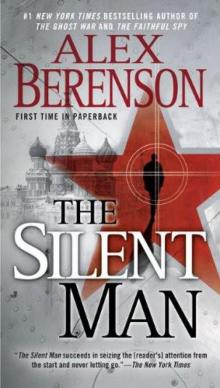- Home
- Alex Berenson
The Ghost War jw-2 Page 4
The Ghost War jw-2 Read online
Page 4
Under other circumstances, thirty-three knots, or even twenty-five, would have been fine. Not tonight, Beck thought.
“How come they’re finding us so easily?” Kang looked at Sung.
“I was wondering that too.” Beck grabbed Sung’s backpack. Sung tried to stop him, but Beck lashed him, a hard flat chop that snapped the North Korean’s head sideways and sent him sprawling. Beck flipped over the pack. A pair of threadbare nylon pants, a thin cotton shirt, cheap black shoes, all drenched—
And, inside a waterproof bag, a plastic box, twelve inches by eight by four, three lights blinking red and green on its top. A transponder, broadcasting the Phantom’s location to every North Korean ship and jet within twenty miles. The man they’d come to rescue had betrayed them.
4
TYSONS CORNER, VIRGINIA
THE ELEVATOR’S DINGY STEEL DOORS GROANED OPEN. Exley stepped onto a threadbare brown carpet that probably hadn’t been vacuumed since Saddam Hus sein was alive. At the end of the corridor a discreet brass nameplate reading “Okay Enterprises” marked a black door. Exley touched her thumb to a security reader, and a deadbolt lock slid back with a heavy thunk.
The welcome scent of fresh coffee filled her nostrils as the door closed behind her. The office that greeted her was as absurdly ordinary as a dentist’s waiting room. Motivational posters and Thomas Kinkade lithographs covered the walls. Narrow wooden chairs sat next to a table of old magazines for visitors to thumb through. But no one ever read the magazines. No one ever visited Okay Enterprises.
“Mornin‘, Ms. Exley.”
“Mornin‘, Tim.” Tim was a solidly built man in his late forties. Today, as every day, he wore pressed khakis and a sport coat to hide his shoulder holster. He rarely spoke. Shafer, Exley’s boss, swore by him. Beside his desk, the coffeemaker burbled happily.
“Guess I got here just in time.”
“Brewed it figuring you were coming.” Tim’s accent was unplaceable, sometimes vaguely Southern, sometimes flatter, more Midwestern. He was already tipping steaming coffee into a plastic mug, camouflage print with “Operation Iraqi Freedom” stamped in white on the side. Shafer had bought the mugs at an Army-Navy surplus store. They’d originally cost $9.99 each but were marked down to a dollar. “Pretty good deal,” Shafer had said. “I wanted some with Rumsfeld’s face on the side, but I guess those got pulped a long time ago.”
Exley took the mug gratefully. “Thanks. Have a nice weekend?”
“Mmm-hmm.” He turned back to the Post on his desk.
I’ll take that as a yes, Exley thought. She and Wells had wondered about Tim’s personal life ever since Shafer brought him in. Was he married, divorced, a bigamist, gay? Did he live near the office? Did he spend weekends on Jupiter and come to Earth via warp drive every Monday morning? She’d never know. She wasn’t even sure that “Tim” was Tim’s real name. Shafer, who did, wasn’t telling.
“Tim’s a very private person,” Shafer said when she asked. “I’m sure you and John can respect that.” And he’d smiled his Cheshire Cat smile. But Shafer had given her one crumb. Tim had never worked for the agency.
TIM’S PEDIGREE, OR LACK THEREOF, was no accident. These scruffy offices reflected the unique and uneasy position that Wells, Exley, and Shafer occupied at the CIA. They still spent about half their time at the Langley campus, a few miles down the road. But Shafer intentionally kept this space as far outside the agency’s orbit as he could.
The agency paid for the suite, and CIA electronics countermeasures teams swept it for bugs every month. What Shafer didn’t tell them was that he had his own contractors sweeping the place as well, looking for devices that the agency might have missed — or planted. And instead of having the agency’s guards provide security, Shafer depended on Tim.
Naturally, Vinny Duto hated the arrangement. He had every right to be unhappy, Exley thought. Shafer was breaking agency regulations, and a dozen laws besides. But after what had happened in New York the year before, Wells, Exley, and Shafer were untouchable.
Of course, the aftermath of the mayhem in Times Square had been messy. Both Wells and Exley had been shot along the way and needed months to recover. And Wells faced another burden. The agency had never disclosed Exley’s identity, but Wells’s name had come out, though not his picture or biographical details. The agency had offered to announce to the world that Wells had died, and even give him a fake funeral. But Wells had rejected that idea, telling Exley that he didn’t want to have to explain to Evan, his son from his first marriage, that he was alive but pretending to be dead. Anyway the plan wouldn’t work, he said. Too many people, both inside and outside the agency, knew he’d survived. Instead he had to cope with moments like the one with the trooper.
For everyday life, the agency had given Wells a new identity, complete with driver’s license, passport, and credit cards. To confuse anyone who was looking for him, Langley had created fake websites that claimed to have the truth about him but were filled with disinformation. A few said Wells had died and was buried under a fake name at Arlington. Others claimed that “John Wells” didn’t exist at all and that the attack he’d stopped was a CIA plot to make the War on Terror seem relevant. Still others said he’d retired from the agency and was living under a CIA protection program.
Fortunately, Wells couldn’t be easily traced. Thousands of men shared his name, and the only pictures of him in circulation were twenty years old. But he couldn’t be completely disguised either. Too many officers at Langley knew him. So did his buddies from the Army and friends from high school and college. Enough fragments about his life were floating around the Internet that a steady stream of tourists now visited his childhood home in Montana.
Meanwhile, Duto and Wells circled each other warily. They’d never gotten along, and even the fact that Wells had stopped the New York attack didn’t end that hostility. Wells was uncontrollable, the anti-bureaucrat. What he’d done in Times Square made the rest of the agency look incompetent, almost irrelevant. But Duto, no fool, knew that he couldn’t attack Wells directly. So he’d gone the other way, giving Wells, Exley, and Shafer free rein. They had Top Secret/SCI/All Access clearances, the same as Duto’s own. They could crash any meeting, read any analysis, get the details of any operation they wanted.
At the same time, Duto had put them outside the agency’s usual chain of command. They reported directly to him, and he’d made clear that he didn’t plan to take responsibility for their mistakes. In a way, they’d become an agency within an agency, a mini-CIA. Exley and Shafer had been in a somewhat similar position years earlier, but now they were a lot more powerful.
Exley wasn’t sure how to use the carte blanche they’d been given, and she didn’t think Shafer did either. As for Wells. Wells spent his time these days working out, riding his motorcycle, and watching westerns. He was in great shape physically, if not mentally. Exley wished she could figure out how to get him out of his funk — a polite word for clinical depression. But she knew better than anyone that pushing on him would only backfire.
She tapped on Shafer’s door.
“Enter.” Shafer was stretched on his couch, poking at his laptop. He was legendary among longtime CIA employees for his fashion sense, and not in a good way. At various times Exley had seen him in red pants, a brown suit — something only Ronald Reagan could pull off — and her personal favorite, black leather boots more appropriate for a transvestite hooker. Shafer had worn those on one of Washington’s rare snowy days. When she asked Shafer where he’d found them, he told her that he couldn’t find his winter boots and had stopped at Nordstrom’s for replacements.
“These were on sale,” he said.
“I’ll bet.”
Sometimes Exley thought Shafer intentionally dressed badly to buttress his reputation as an absent-minded genius. Then he’d show up in something like today’s ensemble — a canary-yellow polo shirt coupled with jeans that ended two inches above his skinny ankles — and she’d reconsider. No one
would knowingly look so ridiculous.
“Flood at home?” she asked him. He looked blankly at her. She decided not to explain.
“Check this out.” Shafer pointed at his computer, its browser set to a page from eBay. “A Dartmouth yearbook, Wells’s year. It’s being advertised as having a picture of ‘The Real John Wells.’ A headshot.”
Exley looked, then looked again to be sure. “Someone’s bidding eight hundred dollars? For a yearbook? Got to be a joke.”
“You should take some candids.”
“Funny,” Exley said.
“Where is your better half, by the way?”
“He was up late riding. As you know.”
“Someone needs to steal that bike.” Shafer closed the laptop. “How is our problem child?”
“Please don’t call him that.” Shafer was infuriating, but she trusted him more than anyone else at the agency, including Wells. She sat beside the window, which was coated with a layer of Teflon that damped the vibrations of the glass, making eavesdropping from outside impossible.
“It’s easier for me,” she said. “I still have David and Jess to take care of. I have my friends. He doesn’t have friends, Ellis. The people he knows die at an unusually high rate.”
“He ought to stop killing them.” Shafer vigorously rubbed his nose. She looked away in case he decided to poke a pinky inside, as she’d caught him doing over the years. “He could write a book. A memoir. At least it would give him something to do.”
She couldn’t help but laugh. “A memoir? ‘How I got shot saving the world.’ By John Wells. Then he could go on Oprahand talk about it. Jump on her couch.”
“Good. Let him quit, then. He wants to be someplace nobody cares who he is, let him run an orphanage in Africa. You too. The agency’ll make sure you never have to worry about money. Duto will write the check himself just to be rid of you.”
She had considered something similar herself. And yet she couldn’t imagine it working, not now. “I don’t think he’s ready for that.” She paused, trying to find the words. “Ellis, nobody else in the world could have stopped Khadri.”
“You don’t believe that.”
“I do. And you do too. Without him Manhattan would be a toxic waste dump. Nobody’s paying for your college yearbook. Or mine.”
“I wish you were my girlfriend,” Shafer said. “You’re good for the ego. Saving a few kids in Africa would be a waste of his talents, you’re saying.”
“Don’t pretend you don’t agree.”
“I agree he’s earned the right to do what makes him happy. You too. If the two of you can figure out what on God’s green earth that might be.”
“It’s not just that. I think he has posttraumatic stress disorder. He doesn’t sleep. Sometimes he’s not there at all. I wake up in the morning, he’s on my laptop, playing solitaire, like he’s been there all night.”
“It would be the least surprising thing in the world if he had PTSD. Have you ever talked to him about what it was like over there?”
Exley felt her eyes well up. She turned away so Shafer couldn’t see. She’d failed. By failing to challenge Wells, she’d failed him. “He needs an op, Ellis. We need to get him an op.”
“Killing more guys isn’t gonna get him over PTSD.”
“It’ll get him off that damned bike. If he’s going to take these chances, let it be for a good cause.”
“You think what we do is for a good cause?”
“Please stop proving how smart you are, Ellis.” She was tired of this conversation. “There’s something else I wanted to ask you about. Unrelated. I think.” She walked out.
IN A FEW MINUTES she was back, carrying a sheaf of papers from her safe.
“After-action reports from Afghanistan, ours and the Army‘s, raw field files. The Pentagon didn’t want to send them, but I gave them my clearance and told them they didn’t have a choice.”
“Membership has its privileges,” Shafer said. Exley handed Shafer some papers. “This is a summary of reports from SF units”—Special Forces. “Basically, the Taliban tactics are steadily improving. Their body counts are down, ours are up.”
“So we took out the dumb ones.”
“It’s more than that. This report mentions ‘company-level coordination typically seen among professionally trained armies.’ And this one.” She opened another file. “‘Enemy command-and-control has improved…. A combination of suppressing fire and point-to-point movement not seen before.’ It’s all over the place.”
“Fine. The Talibs are learning how to fight. Good for them, bad for us. So?”
Exley pulled out another report. “Two months ago, in Kandahar”—the city in southern Afghanistan where the Taliban had been headquartered—“a Colonel Hamar in the Afghan army tells us that the Taliban are getting ‘professional training’—his words — from ‘foreign fighters.’”
“The only foreign fighters in Afghanistan are bin Laden’s boys. They’re hardly professionals. Unless you think blowing yourself to bits is a hallmark of professionalism.”
“Let me finish, Ellis. By the way, the good lieutenant colonel died shortly after passing this rumor along.”
“I’m going to guess it wasn’t natural causes.”
“Throat cut in half.”
“In Kandahar that’s practically natural.”
Exley passed Shafer a photograph of a blood-drenched corpse rolled up in a rug. “His body was left in front of the local police HQ.”
“I guess that’s what’s known as sending a message.”
“Anyway. So the Special Forces say the Talibs are fighting better. Kandahar reports foreign fighters. Then this from the Tenth Mountain Division.” She handed him another file.
“More foreign fighters?”
“In eastern Afghanistan near the Pak border.”
“Nowhere near Kandahar,” Shafer said.
“I looked for more reports from the Tenth Mountain, but there weren’t any. They just rotated in. So I checked back to the old reports from the 101st.” The 101st Airborne Division.
“More foreigners.”
“Gold star, Ellis. Two reports. But no one linked them to the new ones. You know once a division leaves, its intel goes with it. These were also in eastern Afghanistan.”
“Okay. I’ll play.” Shafer began to read again, not skimming this time. Exley waited. One of Shafer’s strengths was his willingness to reconsider his preconceptions when he got new evidence. She wished more people at the agency — and across the river in the White House — shared that trait.
Finally Shafer looked up. “Are you saying what I think you’re saying? The Taliban is getting outside help? Some foreign power is sending its own soldiers to give the Talibs tactical support?”
“I seem to remember we did something similar.” During the 1980s, America had aided Afghan guerrillas against the Soviet Army. Some of those same guerrillas had now turned against the United States.
“Supporting the Talibs would be an act of war against the United States. All of NATO too.”
“Proxy war.”
“Let’s say you’re right. Who’s doing it? The Russians would never help the Talibs. No matter how badly they wanted to hurt us. They haven’t forgotten they lost a hundred thousand soldiers fighting in Afghanistan.”
“Someone else, then.”
“Who? Nobody in NATO. They’re on our side. Iran and Pakistan would hardly count as foreign. North Korea? China? Anyone say anything about Asians?”
“No. The fighters are specifically identified as white. Mercenaries maybe?”
“Maybe. But it’s a seller’s market these days for mercenaries.”
Shafer was right, Exley knew. Former Special Forces soldiers could make $5,000 a week providing security in Iraq. South African and Russian soldiers made less, but even so they could take home $10,000 a month. They would want even more money to help the Taliban against the United States. Not for moral reasons either. Simply because of the risk.
&nbs
p; “The Talibs couldn’t afford these guys,” Shafer said. “Who would pay them?”
“I think it’s time to find out.” She handed him the last report in her file. “Also from the Tenth Mountain Division. Two days ago. A fairly big camp in eastern Afghanistan, at least fifty Talibs. And several white fighters.”
“And they’re going after it?”
“Not at the moment. They have other priorities. And it’s in a very difficult location. Way up in the mountains. I think we should get a satellite up to take a look at it.”
“Sounds reasonable. And then?”
“I don’t know. Depends on what we see. Maybe we can convince the SF to go after it.”
“Okay. Talk to Greg Levine at NSA.” Shafer scribbled a number for her and handed back the files. “If he gives you any lip, tell him to call me. And Jennifer — do you want me to say anything to John?”
She walked out without answering. Let somebody else deal with Wells for once.
THREE HOURS LATER, Exley walked into Shafer’s office at Langley. Wells was already there. A nice surprise. She’d called and asked him to show up, but she hadn’t been sure he would.
“We got them already?” Shafer said. “This must be a record.”
“Levine said they had a satellite right there and it would be no problem as long as I had a cost center for him,” Exley said. “I told him to put it on your tab.” As part of the government’s internal accounting procedures, the National Security Agency dunned the CIA whenever Langley asked for photographs that required the NSA to alter the orbit of its satellites. The agencies had teams of auditors to squabble over the accounts, though in the end the American tax-payer footed the bill for everything. The system was either a necessary check on spending or a cosmic joke, depending on who was explaining it.
“There it is. Your tax dollars at work.” Shafer clicked on a folder on the workstation in the corner, which was linked to a fiber-optic network that transferred encrypted images between Langley, the Pentagon, and NSA headquarters. The agency refused to extend the network to the offices at Tysons Corner, so they had to come to Langley to see photographs like these.

 The Power Couple
The Power Couple The Counterfeit Agent
The Counterfeit Agent The Midnight House
The Midnight House The Prisoner
The Prisoner The Ghost War
The Ghost War The Shadow Patrol jw-6
The Shadow Patrol jw-6 The Shadow Patrol
The Shadow Patrol The Deceivers
The Deceivers The Night Ranger jw-7
The Night Ranger jw-7 The Faithful Spy
The Faithful Spy The Prince of Beers (Kindle Single)
The Prince of Beers (Kindle Single) The Silent Man jw-3
The Silent Man jw-3 The Silent Man
The Silent Man The Wolves
The Wolves The Midnight House jw-4
The Midnight House jw-4 The Ghost Agent
The Ghost Agent The Faithful Spy jw-1
The Faithful Spy jw-1 The Prince of Beers
The Prince of Beers Twelve Days
Twelve Days The Secret Soldier jw-5
The Secret Soldier jw-5 The Ghost War jw-2
The Ghost War jw-2 The Night Ranger
The Night Ranger